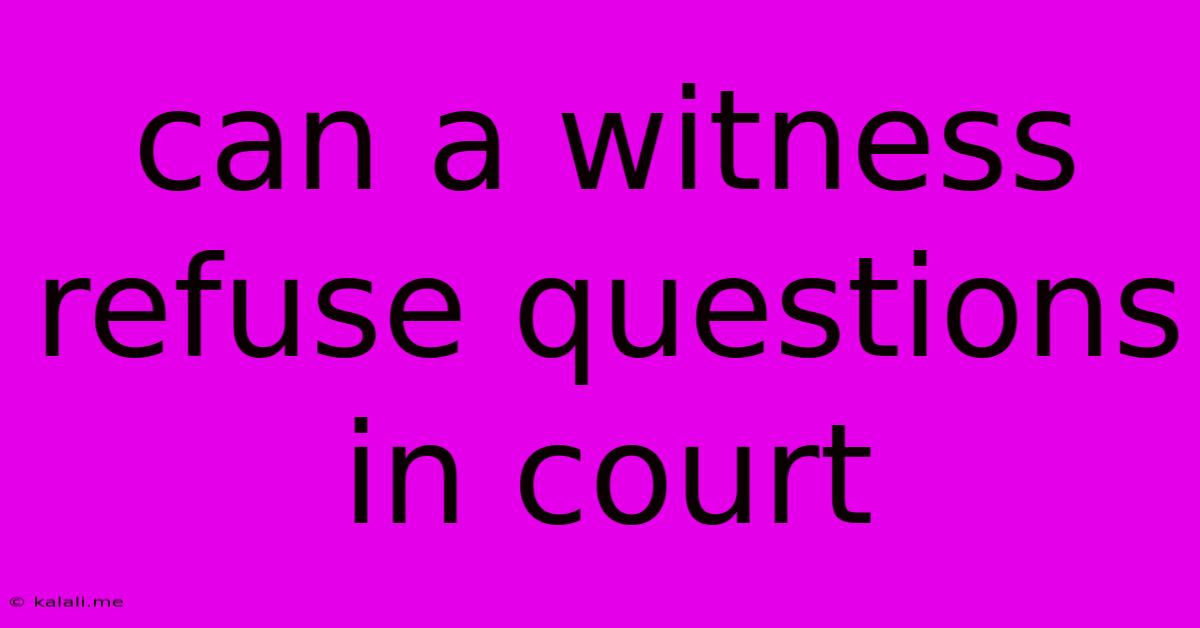Can A Witness Refuse Questions In Court
Kalali
Jun 03, 2025 · 3 min read

Table of Contents
Can a Witness Refuse Questions in Court? Navigating the Complexities of Witness Testimony
The courtroom is a stage where truth and justice intertwine, but the process isn't always straightforward. A key element of any trial is witness testimony, yet the question of whether a witness can refuse questions arises frequently. The answer, unfortunately, isn't a simple yes or no. It depends on a variety of factors, including the jurisdiction, the type of question, and the witness's specific circumstances. This article explores the complexities surrounding a witness's right to refuse questions in court.
Understanding Witness Rights and Obligations
Witnesses are legally obligated to tell the truth, the whole truth, and nothing but the truth. This obligation is crucial for a fair trial. However, this doesn't mean witnesses are completely powerless. Several legal protections and exceptions exist to safeguard their rights and interests. Failing to testify truthfully can lead to serious consequences, including perjury charges.
Situations Where a Witness Might Refuse to Answer
Several legitimate reasons exist for a witness to refuse to answer a question in court:
-
Fifth Amendment Privilege Against Self-Incrimination (US): In the United States, the Fifth Amendment protects individuals from being compelled to incriminate themselves. This means a witness can refuse to answer any question whose answer might expose them to criminal charges. This privilege applies even if the answer might only incriminate them indirectly. It's a powerful right designed to protect individuals from self-incrimination. This doesn't extend to situations where immunity is granted.
-
Spousal Privilege: In many jurisdictions, spouses enjoy a privilege that allows them to refuse to testify against their spouse in certain situations. This privilege protects the sanctity of marriage and encourages open communication within the marital relationship. However, the specifics of spousal privilege vary widely by jurisdiction.
-
Attorney-Client Privilege: Communications between a client and their attorney are generally protected by attorney-client privilege. This means an attorney cannot be compelled to testify against their client regarding confidential communications. Similarly, a client generally cannot be compelled to disclose these confidential communications. This privilege is crucial for effective legal representation.
-
Doctor-Patient Privilege: Similar to attorney-client privilege, many jurisdictions recognize doctor-patient privilege, protecting confidential communications between a patient and their doctor. Exceptions exist, such as when the information is relevant to a criminal investigation or relates to a court-ordered examination.
-
Clergy-Penitent Privilege: This privilege protects confidential communications between a member of the clergy and their penitent. The specifics of this privilege vary by jurisdiction.
-
Objection to Relevance: A lawyer can object if a question is irrelevant to the case. If the judge sustains the objection, the witness doesn't have to answer.
-
Questions that are Vague, Ambiguous, or Misleading: A witness can legitimately refuse to answer a question that is too vague to understand or attempts to trick them into giving misleading information.
Consequences of Refusal
Refusing to answer a question without a valid legal basis can result in contempt of court. This can involve fines or even jail time. Judges will carefully consider the reasons provided by a witness before determining whether a refusal is justified. The judge has the authority to compel testimony, but only in situations where the witness doesn't have a valid legal right to refuse.
Seeking Legal Counsel
Anyone subpoenaed to testify in court should consult with an attorney. An attorney can advise on the witness's rights and obligations and help them navigate the complexities of the legal process. This is particularly crucial if the witness is concerned about self-incrimination or believes they have a valid reason to refuse to answer certain questions.
In conclusion, the question of whether a witness can refuse questions in court isn't simple. Several legal exceptions protect witnesses from being forced to provide self-incriminating information or disclose privileged communications. Understanding these rights and seeking legal counsel when necessary is vital for both witnesses and the integrity of the legal system.
Latest Posts
Latest Posts
-
Get Post From Featured Image Id
Jun 05, 2025
-
How To Change The Color Of A Layer In Photoshop
Jun 05, 2025
-
Linux How To Find Where A Software Is Installed
Jun 05, 2025
-
3 Way Switch Diagram 3 Lights
Jun 05, 2025
-
You Shall Love The Lord Your God With All Your
Jun 05, 2025
Related Post
Thank you for visiting our website which covers about Can A Witness Refuse Questions In Court . We hope the information provided has been useful to you. Feel free to contact us if you have any questions or need further assistance. See you next time and don't miss to bookmark.